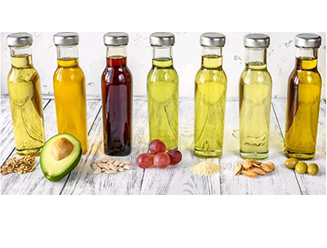Olive oil, sesame oil, walnut oil, sunflower oil… The range of edible oils continues to grow. A real headache for the consumer! Which oil for which use? What are the differences between these fats? And what impacts and benefits on health?
An edible oil is a liquid edible vegetable oil, at a temperature of 15°C. This fat of plant origin, made up of more than 99% lipids, is therefore very energetic. It is obtained by the pressure of a vegetable, such as rapeseed, sunflower, peanut… Each oil is rich in mono-unsaturated or poly-unsaturated fatty acids, which makes it a good food for health. However, each oil has a different composition, and therefore varied benefits, hence the importance of varying edible oils.
Which vegetable food oil to choose?
In cooking, vegetable oil is the fat most commonly used. However, “there is no ideal or perfect oil,” says Ysabelle Levasseur, dietitian-nutritionist. This is why it is important to vary them in order to balance the nutritional intake.
“The nutritional composition varies from one oil to another”, she explains, specifying that they all contain polyunsaturated fatty acids (PUFAs) in different proportions, including the essential fatty acids (EFAs) that our body does not not always know how to synthesize naturally. This is particularly the case of omega-3, good for the brain, vision and for regulating triglycerides, and omega-6, useful for the prevention of cholesterol and cardiovascular disease.
“It is therefore important to favor variety in order and above all to respect the balance between omega 3 and omega 6”, adds the dietician.
The recommended daily intake of essential fatty acids for adults is 2 grams for omega-3 and 9 to 13 grams for omega-6.
• For omega-3, choose linseed, rapeseed or walnut oil;
• For omega-6, consume borage, sunflower or grapeseed oil.
Finally, certain oils, such as walnut, camelina, hemp or soybean oil, contain these two essential fatty acids in large quantities. Ditto for peanut oil, which must however be consumed with caution in case of allergy.
Edible oils are rich in omega-9 and vitamin E
But that’s not all. Some oils, such as rapeseed, hazelnut, olive or peanut are also rich in omega-9, which like omega-6 helps prevent cardiovascular disease and hypertension.
Others have a high vitamin E content with antioxidant properties. For this type of intake, prefer sesame, rapeseed, hazelnut, walnut, sunflower, argan, or macadamia oil. As the dietitian-nutritionist advises: “To benefit from all these virtues, alternate two to three oils with complementary properties such as olive/rapeseed/sunflower or walnut/soya/sesame and prefer organic and first cold-pressed oils.”
What is the best oil for health?
Olive oil is probably the healthiest oil. Rich in vitamins (A, D, E and K) and omega-9, it acts on cholesterol, protects the body against cardiovascular disease, improves blood sugar and regulates intestinal transit.
In the kitchen, you can use it both raw and cooked. Indeed, olive oil is not very sensitive to oxidation and therefore does not deteriorate with the increase in temperature. Preferably choose an organic olive oil, virgin (acidity level less than 2) or “extra” virgin (acidity level less than 1). You will thus taste an oil obtained by mechanical processes, therefore without chemical solvents.
What is the best oil for the heart?
Rapeseed oil is a very good source of omega 3, with an excellent balance of omega 3 and 6. In addition, it is low in saturated fat and rich in antioxidants (vitamin E). Therefore, this vegetable oil is perfectly recommended for all those who want to limit cardiovascular risks, regulate their cholesterol, reduce their hypertension or even take care of their neurons.
In the kitchen, prefer it raw: its intense taste harmonizes very well with salads, particularly those of potatoes, beets, cabbage, lamb’s lettuce… But, contrary to popular belief, rapeseed oil can also be used for the cooking.
What is the best oil for cholesterol?
Cholesterol is an essential lipid that makes up many elements of the body: cells, hormones, vitamin D… Although it is largely produced by the liver, the rest is provided by food.
• The “good” cholesterol captures excess cholesterol in the blood and leads it to the liver to be eliminated with the bile;
• On the contrary, the “bad” cholesterol can form plaques and fatty deposits on the walls of the arteries, and thus prevent the blood from circulating to the heart and the brain.
To take care of your good cholesterol, choose a diet rich in fatty acids (monounsaturated or polyunsaturated) and in omega 6 and omega 3. Sunflower, walnut, soy and rapeseed oils are ideal for this.
Sesame oil, antioxidant
Well balanced in omega 6 and 9, sesame oil is a very good supplier of antioxidants thanks to the presence of sesamin and sesamolin. Another advantage of sesame oil: its low level of saturated fat. It has a good 80% of unsaturated fatty acids, not to mention its lecithin content, an essential nutrient for nerve and brain cells. This oil is recommended especially in case of cholesterol, nervous fatigue, depression, memory problems.
Easy to live with, sesame oil can be used both raw and cooked, and will bring an oriental flavor to your dishes. Stable, it keeps for a long time.
Walnut oil, ally of your brain
Excellent source of omega-3, walnut oil has a very good ratio between omega 3 and 6. Another asset for our health: its content of magnesium, iron, vitamins E and B6. So many qualities that make it the ally of cardiovascular health, the harmonious functioning of the brain, the prevention of depression and certain dementias (especially Alzheimer’s).
Be careful, walnut oil is only consumed raw! It goes wonderfully with bitter salads (endive…), but also carrots, beans, or even grilled fish. Fragile, this oil must be kept cool, because it goes rancid very quickly.
Rapeseed or sunflower oil: which oil to choose?
Very rich in vitamin E (a major antioxidant) and omega 6, sunflower oil should be used sparingly. Because otherwise it is your health that will pay the price: lower good cholesterol, higher blood pressure, various inflammations, memory degradation…
That said, sunflower oil remains interesting for its cholesterol-lowering qualities, its action on the immune system and the nervous system… and its price. Its texture, fluidity and taste are perfect for seasonings.
Rapeseed oil is rich in omega-3 and 9. Like sunflower oil or walnut oil, it has a high smoke point (temperature at which heated oil begins to burn). It is sometimes preferred for cooking over sunflower oil, which loses its nutritional qualities with heat.
Linseed oil, rich in fatty acids
Flaxseed oil is particularly rich in omega-3, which gives it anti-inflammatory benefits for the body. It is also widely used in cosmetics for its benefits on the skin.
In the kitchen, it is to be consumed as a seasoning in raw vegetables and salads, but above all not cooked, fried or heated. It does not support heat, and degrades to such an extent that it can become toxic to health.
You can consume it alone or alternately with rapeseed or walnut oil. Little tip: take a tablespoon of flaxseed oil a day, during the meal you want.
Peanut oil, to be consumed in moderation
This vegetable oil is extracted from peanut seeds (or peanuts) contained in the pods. It is very cultivated in tropical and south-tropical countries.
Peanut oil contains omega 3, 6 and 9: it has a positive effect on cholesterol and prevents cardiovascular disease, like most vegetable oils. Because of its neutral taste, it is mainly used for frying (cooking potatoes, donuts, etc.). You can also use it to cook vegetables or fish in a frying pan, like sunflower oil.
It should be consumed in moderation, as it is rich in saturated fatty acids, which can be bad for your health when consumed in excess.
Palm oil, to be avoided
Because it is very rich in saturated fats (44%), palm oil, which we should rather call palm fat, should theoretically be banned from your diet. It is also singled out from an ethical point of view by associations for the defense of the planet.
“In its current form, the production of palm oil is responsible for significant deforestation, it contributes to the disappearance of many species such as orangutans, uses highly toxic products and the working conditions in plantations there are often deplorable”, denounces the French Federation of associations for the protection of nature and the environment France Nature Environnement (source 1).
If we focus only on the health side, you can still give yourself a little frying from time to time, provided you eat a balanced diet.
Which oils to use according to the different types of cooking?
To make the right choice of oil when you prepare food, discover the recommendations of Éric Reithler, chef consultant Lesieur-Puget.
Which oil to fry a food?
Choose an oil that withstands temperatures above 160°C.
You can use the oils:
• groundnut;
• oleic sunflower;
• olives;
• grape seeds;
• rapeseed.
The choice is a matter of taste. There are those who prefer neutral oils (grape seed, sunflower, etc.), and those who like those with taste such as olive or rapeseed oil.
The latter takes on notes of fish bones when heated, because it is rich in omega 3. It is therefore perfect for cooking fish. To make the best use of the oils, heat the pan dry for three minutes, then pour a little oil before putting the food in it.
What oils should be favored for cooking meat?
The American Heart Association has unveiled its ten key recommendations in terms of healthy eating for cardiovascular health (source 2). Unsurprisingly, we find the usual advice on regular and sufficient physical activity, a substantial intake of fruits and vegetables or the enrichment of your diet with whole grains.
But the association also made an important clarification regarding fat. She therefore advises using “liquid non-tropical vegetable oils such as olive or sunflower oils” for cooking, rather than opting for animal fats (butter, lard, duck fat, etc.). Exit fats from tropical plants, such as shea butter, palm or coconut oil, which are richer in saturated fats.
Which oil to season a food?
All oils can be used. Those of hazelnuts and walnuts are used only raw or in lines at the end of cooking. They can give bitter notes because they are rich in polyunsaturated fatty acids.
What is the best frying oil?
Prefer cheaper peanut, sunflower or rapeseed oils. It is advisable to make a first bath at 160°C, then a second at 180°C. After each frying, the oil must be filtered to avoid any risk of rancidity, and stored in the refrigerator or away from light and heat. It must be changed approximately every eight uses or kept for a maximum of six months.
Source: Health magazine: https://www.santemagazine.fr/alimentation/aliments-et-sante/matieres-grasses-additionees/huiles-alimentaires-laquelle-choisir-170986
Original article in French, loosely translated.





